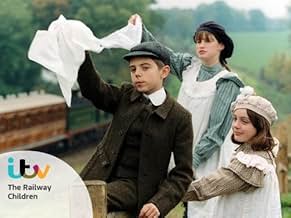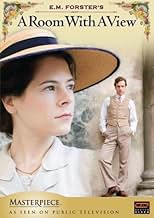Ajouter une intrigue dans votre langueAn anthology drama series featuring primarily British productions.An anthology drama series featuring primarily British productions.An anthology drama series featuring primarily British productions.
- Récompensé par 3 Primetime Emmys
- 4 victoires et 3 nominations au total
Parcourir les épisodes
Histoire
Le saviez-vous
- AnecdotesOn Sesame Street (1969), it was spoofed as "Monsterpiece Theater". Host Cookie Monster appeared as "Alistair Cookie", a spoof of its original host Alistair Cooke.
- ConnexionsFeatured in Television: Drama (1988)
Commentaire à la une
During the 1960's, there existed in the United States a non-commerical television network called National Educational Television (NET). It was so rudimentary that it wasn't linked to its local affiliates by coaxial cable until 1967; before then, it sent films and videotapes to its affiliates by domestic air mail. Despite its modest resources, it had ambitions of being the USA's "fourth network." To that end, it imported and distributed dramatic programs from the BBC. These had little impact until 1969, when NET imported and aired the BBC's "The Forsyte Saga," which became NET's first nighttime hit. Weary of NET's poor relationship with its affiliates, its biased documentaries, and other issues, the Corporation for Public Broadcasting relaced NET in 1969 with a new network, the Public Broadcasting Service (PBS).
Impressed with the success of "The Forsyte Saga," PBS decided to import other miniseries from the UK and broadcast them under the umbrella title of "Masterpiece Theatre." Alistair Cooke, host of the legendary 1950's series "Omnibus," was its erudite host. The first miniseries aired was "The First Churchills," but it was "The Six Wives of Henry VIII" and "Elizabeth R" that made it a hit and help establish PBS in general. "Masterpiece Theatre" followed up with later imports from the BBC such as "Poldark" and "I, Claudius" and some series from Britain's commercial network, ITV, such as "Upstairs, Downstairs." It was generally considered the highest quality series on American television.
"Masterpiece Theater" went into its second decade (1980's) with solid miniseries such as "The Citadel," "The Flame Trees of Thika" (said to be its most popular series), and "A Town Like Alice" from Australia (the first non-British series it aired). But starting in the late 1980's, "Masterpiece Theatre" was often not living up to its name. For every good series such as "Piece of Cake," there were one or two clunkers like "Sleepers." One series, "Clarissa," was downright repulsive. There were various explanations. One was that rising production costs were limiting the number of quality series produced by BBC and the ITV. Another was that cable channels, particularly A&E, were scooping up many of the British shows that used to go to PBS.
This situation persisted during the show's third decade (1990's), during which the show was often absent from the schedule. A series of temporary hosts between Alistair Cooke and Russell Baker seemed to symbolize its uncertainty. A move away from its traditional Sunday night timeslot didn't help matters. On the plus side, PBS and WGBH began to take an active part in the production of its shows.
"Masterpiece Theatre" is now in its fourth decade, a rare achievement for any kind of TV show anywhere. Its 2002-2003 season is being started off with a new production of "The Forsyte Saga," which looks most promising. Still, the series faces an uncertain future in a TV landscape far changed from 1971. Viewers can find high quality programs on innumerable cable and satellite channels, videos, and DVD's and PBS recently logged the worst ratings in its history, prompting its president to openly speculate about the network's viability and even its reason for existence. My advice is to enjoy "Masterpiece Theatre" while you still can.
Impressed with the success of "The Forsyte Saga," PBS decided to import other miniseries from the UK and broadcast them under the umbrella title of "Masterpiece Theatre." Alistair Cooke, host of the legendary 1950's series "Omnibus," was its erudite host. The first miniseries aired was "The First Churchills," but it was "The Six Wives of Henry VIII" and "Elizabeth R" that made it a hit and help establish PBS in general. "Masterpiece Theatre" followed up with later imports from the BBC such as "Poldark" and "I, Claudius" and some series from Britain's commercial network, ITV, such as "Upstairs, Downstairs." It was generally considered the highest quality series on American television.
"Masterpiece Theater" went into its second decade (1980's) with solid miniseries such as "The Citadel," "The Flame Trees of Thika" (said to be its most popular series), and "A Town Like Alice" from Australia (the first non-British series it aired). But starting in the late 1980's, "Masterpiece Theatre" was often not living up to its name. For every good series such as "Piece of Cake," there were one or two clunkers like "Sleepers." One series, "Clarissa," was downright repulsive. There were various explanations. One was that rising production costs were limiting the number of quality series produced by BBC and the ITV. Another was that cable channels, particularly A&E, were scooping up many of the British shows that used to go to PBS.
This situation persisted during the show's third decade (1990's), during which the show was often absent from the schedule. A series of temporary hosts between Alistair Cooke and Russell Baker seemed to symbolize its uncertainty. A move away from its traditional Sunday night timeslot didn't help matters. On the plus side, PBS and WGBH began to take an active part in the production of its shows.
"Masterpiece Theatre" is now in its fourth decade, a rare achievement for any kind of TV show anywhere. Its 2002-2003 season is being started off with a new production of "The Forsyte Saga," which looks most promising. Still, the series faces an uncertain future in a TV landscape far changed from 1971. Viewers can find high quality programs on innumerable cable and satellite channels, videos, and DVD's and PBS recently logged the worst ratings in its history, prompting its president to openly speculate about the network's viability and even its reason for existence. My advice is to enjoy "Masterpiece Theatre" while you still can.
- Mister-UHF
- 11 oct. 2002
- Permalien
Meilleurs choix
Connectez-vous pour évaluer et suivre la liste de favoris afin de recevoir des recommandations personnalisées
- How many seasons does Masterpiece have?Alimenté par Alexa
Détails
Contribuer à cette page
Suggérer une modification ou ajouter du contenu manquant

Lacune principale
By what name was Masterpiece Theatre (1971) officially released in India in English?
Répondre

































